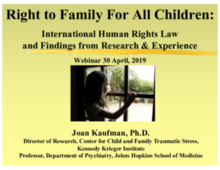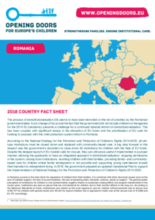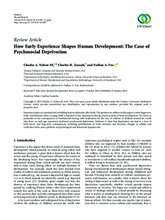Displaying 81 - 90 of 220
“BE THE CHANGE! Partnering to improve the transition from alternative care to independent living” will be held in Bucharest from 12-13 June 2019.
In this article, the authors present findings from a follow‐up assessment from the Bucharest Early Intervention Project (BEIP) - the first longitudinal study to investigate the neurodevelopment of institutionalized infants randomized to a foster care (FCG) intervention versus care as usual (CAUG)- of brain electrical activity as indexed by resting EEG at age 16 years.
In a sample of 136 Romanian children from the Bucharest Early Intervention Project (BEIP), who were exposed to early psychosocial deprivation in the form of institutional care, the authors of this study examined caregiver-reported and observer-rated signs of disinhibited social engagement disorder (DSED).
This presentation, given at Disability Rights International and the European Network on Independent Living's webinar on the right of all children to a family, outlines the Consensus Statement Position on Group Care for Children and Adolescents of the American Orthopsychiatric Association and reviews the research on the detrimental effects of institutionalization on children from the Bucharest Early Intervention Project and other studies.
This study, part of the Bucharest Early Intervention Project, compared the consequences of long-term high-quality foster care versus standard institution-based care which began in early childhood on cardiometabolic and immune markers assessed at the time of adolescence.
This factsheet highlights the developments and challenges still ahead in Romania and offers key recommendations to the EU and the national government to ensure that children are cared for in family-based settings.
The present study addressed institutionalised children and staff members' perspectives about bullying in Residential Care settings (RCs) in five European countries (Bulgaria, France, Greece, Italy and Romania.).
This study draws upon data from the Bucharest Early Intervention Project (BEIP), a longitudinal study exploring the impact of severe psychosocial deprivation on child health and development to examine the relationship between telomere length and psychopathology.
This article revists a report from February 1990 that shone light on the situation of children in orphanages in Romania and the high rate of HIV infection among them.
The question addressed in this paper from the Neural Plasticity journal is what happens to brain and behavior when a young child is deprived of key experiences during critical periods of brain development.



